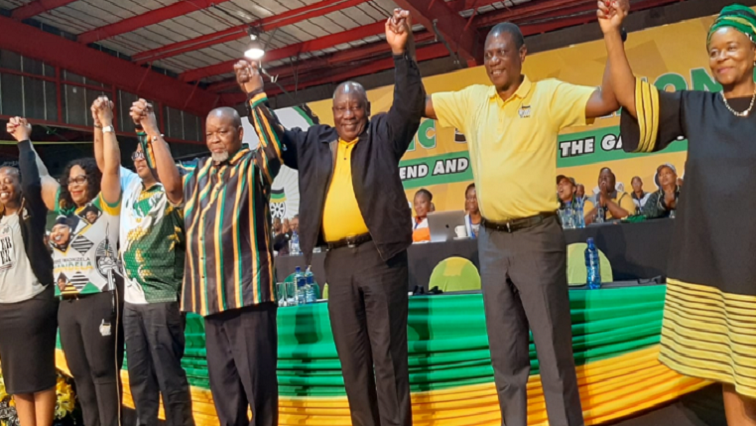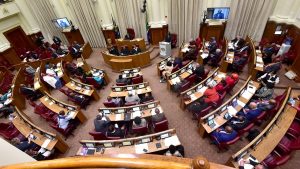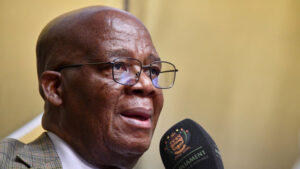Will the majority of poor South Africans benefit from the outcomes of the ANC 55th elective conference of 2022 as envisaged in the National Development Plan, Vision 2030? writes political analyst Fikile Vilakazi.
The South African state remains a neoliberal capitalist economy. It is an economy that has experienced structural adjustment impositions by the International Monetary Fund and the World Bank and had already begun succumbing to its pressures globally by instituting internal economic reforms to privatise, deregulate and reduce state intervention in the economy by the late 1980s.
This was due to notable economic decline since the 1960s measured in GDP rates which stood at 5.5% in the 60s, 3.3% in the 70s, 2.2% in the 80s, 1.9% in 1993 and 2.3% in 1994 when the ANC took over political power and now at about 1.6% after 28 years of ANC led democratic government as indicated by the newly elected secretary general, Fikile Mbalula at the ANC national elective conference media briefing at NASREC on the 19th of December 2022.
Even though the labour movement succeeded to resist privatisation in the late 80s, the state resorted to commercialisation of its assets successfully indirectly privatising transport services to Transnet, the telecommunication and postal services were divided into Telkom and the South African Postal Services Limited and electricity provision transferred to ESKOM and the recently the South African Airways amongst us.
So, by the late 80s, provision of basic economic infrastructure was being transferred to the hands of private capitalist enterprises with reduced and/or shared state intervention. Since then, the provision of economic infrastructure has always been seen as pivotal in facilitating economic growth in South Africa; even though various ideological approaches influenced such an investment drive throughout the 90s.
Post-1994, the ANC government introduced the Reconstruction and Development Program [RDP] premised on Keynesian economic growth theory which promotes growth through ‘reconstruction, redistribution, direct state involvement and a living wage’ for the majority. The RDP White Paper highlights some of these commitments in relation to the importance of social and economic infrastructure for economic growth.
The RDP White Paper unsuccessfully attempted to reconcile the original Keynesian approach to the RDP with a set of policy statements and recommendations that were inspired by the neo-liberal framework that had long been alternatively offered, even if in different variants, by big business, the International Monetary Fund (IMF) and the World Bank, and, not least, the apartheid state itself in its twilight years in the form of the Normative Economic Model (NEM)’. As a result, the RDP was abandoned for the Growth, Employment and Redistribution Strategy [GEAR] in 1996 according to former Minister of Finance Trevor Manuel.
GEAR was later in 2006 replaced by the Accelerated Shared Growth Initiative for South Africa –ASGISA. GEAR and ASGISA were largely criticised for their capitalist neoliberalism approach to economic growth with very little benefit to poverty reduction for the majority of poor citizens of South Africa.
The current National Development Plan and the Industrial Policy Action Plan follow a similar economic growth path with a large role set for capitalist markets in the form of state-owned enterprises [SOEs] and Small, Micro and Medium Enterprises [SMMEs] and Foreign Multinational Corporations [FMCs] in the anticipated drive towards economic growth. The heavy reliance of the South African economy on capitalist markets since the 80s points to a conclusion that South Africa is largely a capitalist economy.
State capitalist economy in this instance being the widespread influence of government in the economy either by owning majority or minority equity positions in companies or through the provision of subsidized credit and/or other privileges to private companies. The challenge of capitalist-driven economic growth is that it is concerned with capital which is understood in Marxist terms to mean ‘surplus value captured by capitalists, the bourgeoisie, who control production means, in the circulation of commodities and monies between the production and consumption processes whilst exploiting those who do not have nor own the means of production’ in society. In such an economic system, class struggles become more intense and their existence is not coincidental but a deliberate structural act of capitalist elites to maintain that very system of capitalist modes of production in order to flourish.
In South Africa, this has been observed in public-private partnerships [PPP] that emerged during the demise of apartheid and operated throughout the democratic dispensation thus far in the form of state-owned enterprises [SOEs] and expanded public works programs [EPWP]and in the role of BIG business in the economy. So, the vision of a transformative developmental state that was once envisioned in the Reconstruction and Development Programme became an intellectual project that launched democracy only to be swiftly abandoned for neoliberal capitalist GEAR, ASGISA and possibly the current National Develop Plan, Vision 2030.
We are 8 years away from 2030, which is around the corner and youth unemployment stands at 63.9% according to the quarterly labour force survey of 2022 in South Africa which came out in June. This figure was about 35% in the year 2000 – 2002. Clearly, something is getting worse given that these figures have doubled in the last 20 -22 years. A compelling question then is whether the National Development Plan, Vision 2030 has anything to offer poor, vulnerable and destitute citizens of South Africa, many of whom are youth, female, gender nonconforming, queer, LGBTIQA+ and black.
There is no doubt that ‘lack of infrastructure continues to be a key obstacle to growth and development in many low-income countries. In Sub-Saharan Africa in particular, only 16 percent of roads are paved, and less than one in five Africans has access to electricity whilst transport costs are the highest in the world and act as a significant constraint on trade expansion’. Whilst this is happening, there is an ongoing debate on whether provision of public infrastructure should be privatised or remain the responsibility of the state. In South Africa, this debate has been going on since the 1980s and continues unresolved creating a perpetual dichotomy between the state, the labour movement, business and civil society.
The situation is further aggravated by the heightened levels of state corruption witnessed within government procurement processes geared toward infrastructural development as detailed in the Zondo Commission Report.
Our roads are full of potholes, railway lines are under duress, theft of copper cables that supply electricity within communities is on the rise and all of these hamper possibilities of creating an enabling economic environment that can grow comfortably to absorb and reduce the unemployed strata of our society. Now, many of the cases of corruption listed on the Zondo Commission Report remain unprosecuted and therefore unresolved, the majority of whom are members of the ANC and some were elected to serve in the newly elected top 7 of the National Executive Committee of the ANC, who may become government if elected in the upcoming 2024 elections.
Where does this leave desperate citizens of South Africa? Will this National Development Plan, Vision 2030 ever be realised and benefit the majority of poor and unemployed South Africa, most of whom are employable by the way? We were told that part of the agenda of NDP, Vision 2030 is to curb state corruption by 2030. Can this newly elected NEC take the country to that realization when issues of BOSASA, Phalaphala and the Zondo Commission remain unresolved? Minister Godongwana confirmed that the second term of President means continuity of the current economic policy and macro-economic framework.
All I know is that South Africans cannot wait any longer! Our patience as citizens has thinned out! We are choking and we are dying! We need change. This is my reading of the situation. Thokozani!
Fikile Vilakazi is a Political Analyst: International and Public Affairs Cluster, School of Social Sciences, University of KwaZulu Natal.






